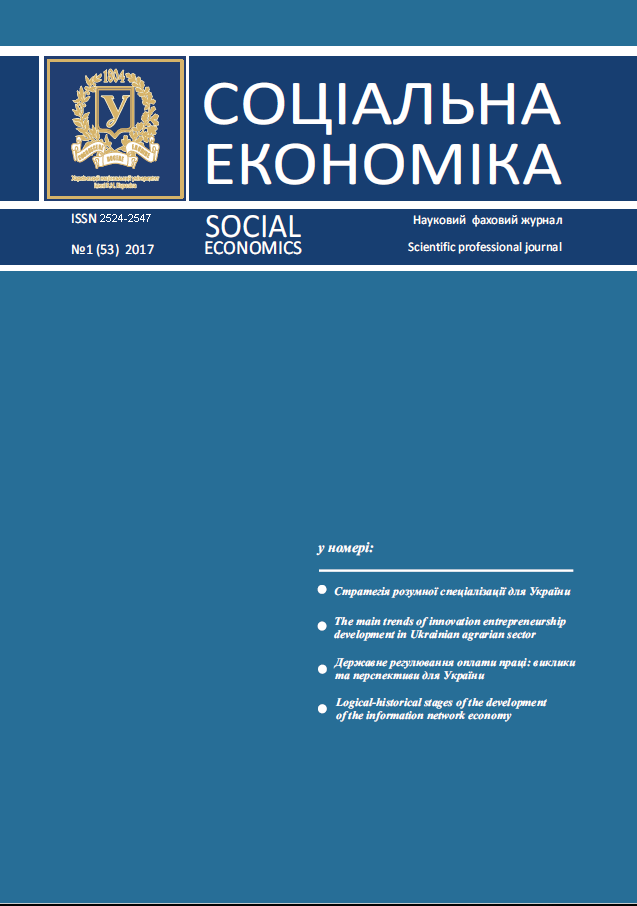Smart specialization strategies for Ukraine
Abstract
The article deals with the history and theoretical origins of the concept of strategies of smart specialization, its connection with other concepts and strategies, the normative base and the practice of its implementation in the European Union. The expediency of developing and implementing a strategy for smart specialties for Ukraine is analyzed, current status and perspectives are analyzed too. Also the existing foreign experience in designing economic and scientific and technical policy for further adaptation in Ukraine is reviewed. The landmarks of implementation of the European experience – “Strategy of Smart Specialization” (3S), its sources and tools according to the strategic goals of European integration – have been formed. The European integration aspirations of Ukraine and the association agreements already in force and the creation of a deep free trade zone have been analyzed. The main driving forces and incentives for the development of the CPI are the loss of traditional markets and the break-up of lasting cooperative ties with the Russian Federation; passive position of the state, which may lead to the actual imposition of low-tech specializations; the creation of profile regional clusters and the widespread use of the public-private partnership instrument; the need for the active use of all powers of the Associate Member status of Horizon 2020 for access to the design and implementation of 3S in Ukraine.
Downloads
References
COMMUNICATION FROM THE COMMISSION “BUILDING AN INCLUSIVE EUROPE”, COM(2000) 79 final http://qoo.by/2STj.
Europe 2020 strategy “Європа 2020: Стратегіярозумного, стійкогоівсеохоплюючогозростання” Brussels, 3.3.2010, COM(2010) 2020 final. https://ec.europa.eu/info/strategy/european-semester/framework/europe-2020-strategy_en.
Lisbon Strategy evaluation document, Brussels, 2.2.2010, SEC(2010) 114 finalhttp://ec.europa.eu/europe2020/pdf/lisbon_strategy_evaluation_en.pdf.
The Competitive Advantage of Nations, Michael E. Porter, Harvard Business Review, the March–April 1990 Issue, https://hbr.org/1990/03/the-competitive-advantage-of-nations.
Clusters and the New Economics of Competition, Michael E. Porter, Harvard Business Review, from the november-december 1998 issue, https://hbr.org/1998/11/clusters-and-the-new-economics-of-competition?referral=03758&cm_vc=rr_item_page.top_right.
Н.Н. Колосовский, «Избранные труды», Смоленск, «Ойкумена», 2006. http://www.ecoross.ru/files/books/Kolosovskiy,%202006.pdf.
Knowledge Economists Policy Brief n° 9, June 2009. http://ec.europa.eu/invest-in-research/pdf/download_en/kfg_policy_briefs_no_5_9.pdf.
Industrial policy for the twenty-first century, Dani Rodrik, Harvard University, John F. Kennedy School of Government. https://www.sss.ias.edu/files/pdfs/Rodrik/Research/industrial-policy-twenty-first-century.pdf.
Smart specialisation in a truly integrated research area is the key to attracting more R&D to Europe. Dominique Foray and Bart Van Ark. http://ec.europa.eu/invest-in-research/pdf/download_en/policy_brief1.pdf.
“Innovation-driven Growth in Regions: The Role of Smart Specialisation”, © OECD/OCDE, 2013. https://www.oecd.org/innovation/inno/smart-specialisation.pdf.
COMMUNICATION FROM THE COMMISSION TO THE EUROPEAN PARLIAMENT, THE COUNCIL, THE EUROPEAN ECONOMIC AND SOCIAL COMMITTEE AND THE COMMITTEE OF THE REGIONS “Regional Policy contributing to smart growth in Europe 2020”, COM(2010) 553 final, 6.10.2010. http://qoo.by/2STn.
Guide to Research and Innovation Strategies for Smart Specialisations (RIS 3). http://ec.europa.eu/regional_policy/sources/docgener/presenta/smart_specialisation/smart_ris3_2012.pdf.
Регламент ЄС №1303/2013 щодо спільних положень Європейського фонду регіонального розвитку, Європейського соціального фонду, Фонду Єдності, Європейського аграрного фонду для розвитку сільської місцевості та Європейського фонду морського та рибного господарства та визначаються загальні положення щодо Європейського фонду регіонального розвитку, Європейського соціального фонду, Фонду Єдності та Європейського фонду морського і рибного господарства та скасовується Регламент Ради (ЄС) №1083/2006.https://ec.europa.eu/digital-single-market/en/news/regulation-eu-no-13032013-european-parliament-and-council.




